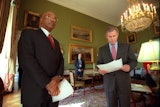Political observers say that the state of Virginia likely will play a major role in November’s presidential election, particularly after Gov. Terry McAuliffe used his executive power last month to restore voting rights to more than 200,000 of the state’s convicted felons.
And that may be a good sign for Hillary Clinton, who officially clinched the Democratic nomination this week and will now go on to challenge Republican businessman Donald J. Trump in the general election.
Despite her strong support for her husband’s 1994 crime bill — which some say helped to spur the mass incarceration movement in the United States — and for once referring to young gang members as “super-predators,” Clinton has been barnstorming the nation, calling for criminal justice system reform and, in the process, has been trying to win over skeptical African-American voters.
“Something’s wrong when Black kids get arrested for petty crimes but White kids who do the same things don’t,” Clinton said in a rousing speech delivered in April at the convention of the National Action Network, the civil rights group founded in 1991 by the Rev. Al Sharpton.
“Mass incarceration is just one part of a broader set of interlocking challenges, because years of underinvestment and neglect have hollowed out many predominantly African-American communities. There aren’t enough jobs and poverty persists from generation to generation. Not enough families, still today, have access to the education they deserve, the affordable housing they need to live in.”
With a stroke of a pen, McAuliffe’s use of executive power was likely done in part to help Clinton, a longtime ally, and Democrats in general. McAuliffe served as the chairman of the Democratic National Committee from 2001 to 2005.
Long considered a swing state, the governor’s executive order will permit all Virginia felons who have served their prison time and completed parole or probation to register to vote. Experts say that more than half of Virginia’s convicted felons are African-Americans.
That’s good news to the Rev. Kenneth Glasgow, an activist who leads The Ordinary People’s Society (TOPS), a faith-based nonprofit focused on the restoration of voting rights for ex-felons and helping inmates reenter society.
“I think what the governor in Virginia has done is remarkable,” says Glasgow, who served prison time in Florida and Alabama prisons and was among the first wave of Alabamians with criminal records to register to vote under a law passed during the 2003 legislative session. “I hope that every other governor follows suit. Being the one and only person to ever win a lawsuit causing people in prison in Alabama to be able to vote, seeing the governor do this in Virginia spells out a message of freedom across the country.”
Glasgow said that his organization will travel to Virginia in the upcoming months to help register scores of new voters.
“People have to realize that, when a person gets their voting rights, it declares and decrees them a citizen,” he said.
Dr. Khalilah Brown-Dean, an associate professor of political science at Quinnipiac University and an expert on the criminal justice system, said that felon disenfranchisement laws have always represented both the beauty and tragedy of federalism in the United States.
“Because there isn’t an affirmative right to vote in our Constitution, states have the right to set the time, place and manner of elections,” she said. “That means that my home state of Virginia could tinker with its disenfranchisement laws in the post-Reconstruction era to limit the number of Blacks and poorer Whites eligible to vote.”
Brown-Dean said that these laws set in motion decades of limiting citizenship, not just for individuals convicted of felonies, but for entire communities — particularly people of color and those living in urban areas throughout the state.
“Given the growing racial diversity in various pockets of the state and the concentration of punishment within many of those same pockets, this latest move by Gov. McAuliffe will significantly increase the number of people who will now be eligible to vote,” she said. “Indeed, much of the resistance to easing these restrictions came from legislators concerned that Democrats would earn an advantage by having more people of color eligible to vote and, in turn, elect a candidate of choice. The major challenge, however, is converting this potential into actual participation.”
Dr. Ravi K. Perry, an associate professor of political science at Virginia Commonwealth University in Richmond, said that the long-term impact of the governor’s action is too early to determine, even as grassroots organizations are registering voters on the ground.
“There is a difference between registration and turnout,” said Perry. “We also don’t know their voting behavior prior to their convictions so it’s hard to make an assessment.”
Perry said that some of the more local elections such as the mayoral race in Richmond may gain more participation by these newly registered voters who, in many cases, have been longtime Virginia residents and have ties to local communities in the state.
Jamal Eric Watson can be reached at jwatson1@diverseeducation.com. You can follow him on Twitter @jamalericwatson.















